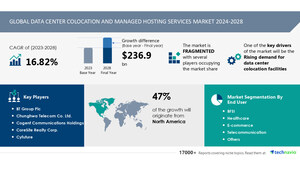NEW YORK, Aug. 28, 2024 /PRNewswire/ -- Report on how AI is driving market transformation- The global motion control market size is estimated to grow by USD 5.69 billion from 2024-2028, according to Technavio. The market is estimated to grow at a CAGR of over 6.03% during the forecast period. Integration of motion control systems with digital drives is driving market growth, with a trend towards growing adoption of iot in the motion control industry. However, inherent challenges related to use of automated systems poses a challenge. Key market players include ABB Ltd., ACS Motion Control Ltd., ADVANCED Motion Controls, Aerotech Inc., Beckhoff Automation GmbH and Co. KG, Delta Computer Systems Inc., Dover Motion, Eaton Corp. Plc, Galil Motion Control, Kollmorgen Corp., Mitsubishi Electric Corp., Moog Inc., Nanotec Electronic GmbH and Co. KG, OMRON Corp., Parker Hannifin Corp., Robert Bosch GmbH, Rockwell Automation Inc., Schneider Electric SE, Siemens AG, and Yaskawa Electric Corp..
Get a detailed analysis on regions, market segments, customer landscape, and companies - Click for the snapshot of this report
Forecast period |
2024-2028 |
Base Year |
2023 |
Historic Data |
2018 - 2022 |
Segment Covered |
Application (Metal and machinery manufacturing, Packaging and labeling, Robotics, Semiconductor and electronics, and Others), Product (Electronic devices, Actuators, AC drives, Motion controllers, and Others), and Geography (APAC, North America, Europe, Middle East and Africa, and South America) |
Region Covered |
APAC, North America, Europe, Middle East and Africa, and South America |
Key companies profiled |
ABB Ltd., ACS Motion Control Ltd., ADVANCED Motion Controls, Aerotech Inc., Beckhoff Automation GmbH and Co. KG, Delta Computer Systems Inc., Dover Motion, Eaton Corp. Plc, Galil Motion Control, Kollmorgen Corp., Mitsubishi Electric Corp., Moog Inc., Nanotec Electronic GmbH and Co. KG, OMRON Corp., Parker Hannifin Corp., Robert Bosch GmbH, Rockwell Automation Inc., Schneider Electric SE, Siemens AG, and Yaskawa Electric Corp. |
Key Market Trends Fueling Growth
The Internet of Things (IoT) is revolutionizing industries by enabling real-time data collection and transmission from various devices, including sensors and actuators. This data empowers end-users to make informed decisions, driving the adoption of IoT in various sectors. Motion control systems, including programmable multi-axis motion controllers, are increasingly being connected to IoT networks. These systems consist of components such as servo drives, motors, gearboxes, and software. Ethernet-based networks, like EtherCAT, are facilitating this connectivity. For instance, Galil Motion Control's EDD-3701x series and OMRON's NX1P Machine Automation Controller offer extensive IoT capabilities. These controllers can collect data from sensors via IO-Link and EtherCAT, enabling predictive maintenance and real-time decision-making. The adoption of IoT in motion control systems is expected to improve performance, efficiency, and accessibility of built-in machine intelligence. IoT also facilitates high-speed operations with minimal effort and enables early detection of anomalies or deviations from quality indicators. These factors will continue to drive the growth of the motion control market during the forecast period.
The Motion Control Market is experiencing significant growth due to trends like digitalization, AI, and automation. Digitalization is driving the adoption of motion controllers for precise target positions and trajectories in various industries. Renewable energy sectors like solar and wind power are integrating motion control systems for resource utilization and waste reduction. Safety is a top priority, with motion controllers ensuring worker safety in compressor stations and metal cutting applications. AI and self-organizing factories enable autonomous decision-making, reducing production downtime and replacement expenses. Cloud technology, real-time data analysis, and remote monitoring enable efficient resource utilization and waste reduction. Motion control systems are essential for industrial robots, servo motors, and machinery in smart factories. Communication protocols ensure seamless integration with sensors and other systems. Advanced motion controls are vital for energy-efficient solutions in factories, including heavy maintenance and servicing. Closed-loop systems offer improved accuracy and stability, while open-loop systems provide cost-effective solutions for manual controls. Motion control systems are essential for automation in various industries, from manufacturing to renewable energy. The market continues to evolve, focusing on energy-efficient solutions and reducing overall time and costs.
Discover a Comprehensive 360° Market Analysis: Understand the Impact of AI. For detailed information- Request Sample!
Market Challenges
- Businesses worldwide face the challenge of adapting to dynamic market conditions, necessitating the need for upgrading motion control systems in various industries. However, the inflexibility and high costs associated with automated systems, particularly those equipped with hydraulic equipment, deter small and medium enterprises (SMEs) from making the necessary upgrades. The replacement or upgrade of motion control systems is a time-consuming and costly process, involving significant investments in research and development (R&D) for vendors to remain competitive. Advanced motion control systems require substantial initial investments, and stringent regulations and standards necessitate additional capital expenditures. Customization also increases production costs, as vendors must design equipment according to clients' specific applications and requirements. These high capital investments and R&D costs pose a significant challenge to vendors, limiting their profitability and market growth during the forecast period.
- Motion control market is experiencing significant growth due to the increasing automation in factories and machinery. The integration of robotic systems, sensors, and communication protocols in motion control systems is driving this trend. Smart factories and energy-efficient solutions are the new norm, with manufacturing companies seeking to reduce replacement expenses and save time through advanced motion controls. However, challenges remain. Heavy maintenance and servicing can be time-consuming and costly. The Industrial Revolution 4.0 brings new technologies like real-time communication, artificial intelligence (AI), and Industrial IoT (IIoT) to the table, but implementing these requires investment and expertise. Motion control systems must be precise and energy-efficient, with motors, servo drives, and variable frequency drives playing crucial roles. The automotive sector, e-commerce, logistics, and dosage formulations are major industries adopting motion control technology. Warehouse automation, robotics, and position controls are also gaining popularity. Connected machines, digital twins, and edge computing are modern technologies transforming motion control. However, ensuring safety and minimizing accidents remains a challenge. Overall, the motion control market is evolving, with sensors and feedback, step motors, and communication protocols playing essential roles.
For more insights on driver and challenges - Download a Sample Report
Segment Overview
This motion control market report extensively covers market segmentation by
- Application
- 1.1 Metal and machinery manufacturing
- 1.2 Packaging and labeling
- 1.3 Robotics
- 1.4 Semiconductor and electronics
- 1.5 Others
- Product
- 2.1 Electronic devices
- 2.2 Actuators
- 2.3 AC drives
- 2.4 Motion controllers
- 2.5 Others
- Geography
- 3.1 APAC
- 3.2 North America
- 3.3 Europe
- 3.4 Middle East and Africa
- 3.5 South America
1.1 Metal and machinery manufacturing- The Motion Control Market refers to the industry that produces and supplies systems and components for automating the movement of machinery and robots. These systems enable precise and controlled motion, enhancing manufacturing efficiency and productivity. Key players in this market include Bosch Rexroth, Schneider Electric, and Siemens. Market growth is driven by increasing automation in various industries, such as automotive, electronics, and food and beverage.
For more information on market segmentation with geographical analysis including forecast (2024-2028) and historic data (2018 - 2022) - Download a Sample Report
Research Analysis
Motion control systems play a crucial role in automation, powering machinery and robotic systems to enhance manufacturing processes. These systems utilize motors, drives, position controls, and sensors for precise movement and feedback in factories. Energy-efficient solutions are a priority, integrating industrial IoT (IIoT) and connected machines to optimize resource utilization and reduce waste. Smart factories leverage control algorithms, artificial intelligence (AI), and self-organizing systems for improved production efficiency, reduced downtime, and enhanced worker safety. Remote monitoring capabilities enable real-time data analysis and proactive maintenance, further boosting productivity and profitability. Warehouse automation and robotics are also significant applications, streamlining logistics and inventory management.
Market Research Overview
Motion control systems play a crucial role in automating factories and machinery, enabling precision, speed, and energy efficiency in various industries. These systems utilize servo drives, variable frequency drives, and motors to control the movement of automated equipment, from industrial robots to dosage formulations and compressor stations. Advanced motion controls incorporate sensors and feedback, communication protocols, and real-time data analysis for improved resource utilization and waste reduction. The Industrial Revolution 4.0, driven by information technology, digitalization, and modern technologies, has accelerated the adoption of motion control systems in smart factories and warehouses. Industrial IoT (IIoT) and connected machines enable real-time communication, digital twins, edge computing, and autonomous decision-making. Motion control systems are essential in manufacturing sectors like automotive, e-commerce, logistics, and renewable energy, ensuring safety, energy efficiency, and production optimization. With the integration of artificial intelligence (AI), motion controllers can optimize target positions, trajectories, and control algorithms for resource utilization and worker safety. Heavy maintenance and servicing are reduced through remote monitoring and real-time data analysis, minimizing downtime and replacement expenses. Motion control systems cater to various applications, including metal cutting, solar power, wind power, and compressor stations, ensuring optimal performance and precision.
Table of Contents:
1 Executive Summary
2 Market Landscape
3 Market Sizing
4 Historic Market Size
5 Five Forces Analysis
6 Market Segmentation
- Application
- Metal And Machinery Manufacturing
- Packaging And Labeling
- Robotics
- Semiconductor And Electronics
- Others
- Product
- Electronic Devices
- Actuators
- AC Drives
- Motion Controllers
- Others
- Geography
- APAC
- North America
- Europe
- Middle East And Africa
- South America
7 Customer Landscape
8 Geographic Landscape
9 Drivers, Challenges, and Trends
10 Company Landscape
11 Company Analysis
12 Appendix
About Technavio
Technavio is a leading global technology research and advisory company. Their research and analysis focuses on emerging market trends and provides actionable insights to help businesses identify market opportunities and develop effective strategies to optimize their market positions.
With over 500 specialized analysts, Technavio's report library consists of more than 17,000 reports and counting, covering 800 technologies, spanning across 50 countries. Their client base consists of enterprises of all sizes, including more than 100 Fortune 500 companies. This growing client base relies on Technavio's comprehensive coverage, extensive research, and actionable market insights to identify opportunities in existing and potential markets and assess their competitive positions within changing market scenarios.
Contacts
Technavio Research
Jesse Maida
Media & Marketing Executive
US: +1 844 364 1100
UK: +44 203 893 3200
Email: [email protected]
Website: www.technavio.com/
SOURCE Technavio

WANT YOUR COMPANY'S NEWS FEATURED ON PRNEWSWIRE.COM?
Newsrooms &
Influencers
Digital Media
Outlets
Journalists
Opted In






Share this article